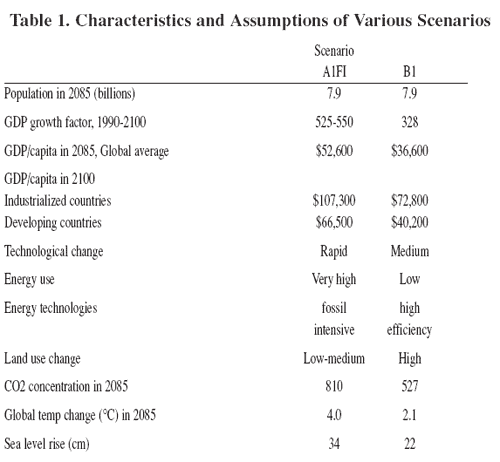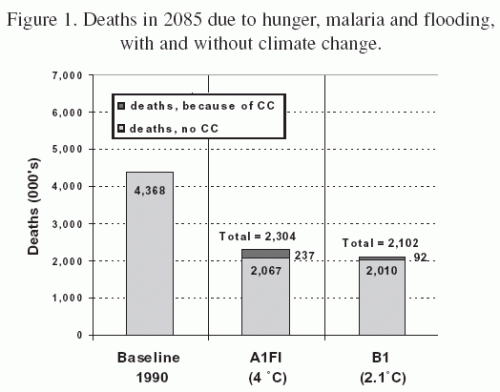Priorities and the Precautionary Principle
Indur Goklany (pdf) has deconstructed the IPCC climate forecasts and models and finds something interesting -- for all the forecasts of catastrophe, it is hard to find it in the actual IPCC numbers (vs. off-the-cuff statements by folks like Al Gore).
First, one needs to understand the basis for the various scenarios crafted by the IPCC. I will leave some out, and focus on Goklany's analysis of just two - the IPCC A1F1 and B1 scenarios. (the charts below have been edited to simplify them to just these two scenarios)

One can think of A1F1 being close to a "do nothing" scenario on CO2, what is often called a Richer but Warmer scenario. The B1 scenario represents fairly large interventions in Co2 use and investments in energy technologies, with lower CO2 concentrations and as a result lower but still positive GDP growth (it takes only a small change in GDP growth to result in large changes in GDP 80 years hence -- the miracle of compounding). This is the cooler but poorer scenario. I know the Left has a fantasy that climate legislation is somehow an economic engine, but most economists on this reality plane achnowlege a tradeoff between CO2 intervention and economic growth.
Goklany collates the impact on mortality from these two scenarios in the IPCC report:

Note that I am not even bothering to quibble with the IPCC numbers, which I could. I have written plenty that these temperature increase forecasts are based on assumptions of positive feedback in the climate that make little sense. Further, it makes little sense that the poorer and less advanced world in B1 would have lower base mortality than the richer, more advanced world.
Nevertheless, we can make three observations:
- The difference in mortality from "do nothing" to "strong intervention" is small, and I would suspect hardly statistically significant
- The improvement in mortality from advancing technology and wealth from the 1990 baseline dwarfs the effects of climate change
- The mortality improvements from massive focus on climate change are trivial compared to those that could be achieved with much less expensive focus on other issues.
Hat tip to Watts Up With That, who has more here in a guest essay by Goklany.
David:
This is similar to Freeman Dyson's approach, and I think that there is a lot of truth here.
April 30, 2009, 2:14 pmDr. T:
The assumptions all suck, but the one that amuses me the most is that the developing nations will have Gross Domestic Products per capita that are over 60% of the GPDs/capita of the industrial nations.
Today, I don't believe that the developing nations' GDPs/capita are even 25% of the industrial nations' GDPs/capita. So, the IPCC is postulating 2-3 fold relative increases in GDP. How did they come up with that?
April 30, 2009, 6:45 pmBob Sykes:
By far most weather-related deaths occur in extreme cold, so even if heat-related deaths increase a warmer planet will have fewer weather-related deaths not more.
May 1, 2009, 4:29 am